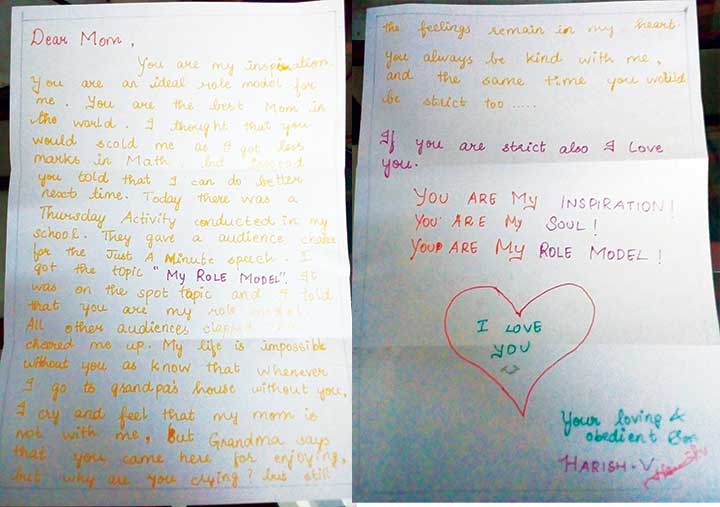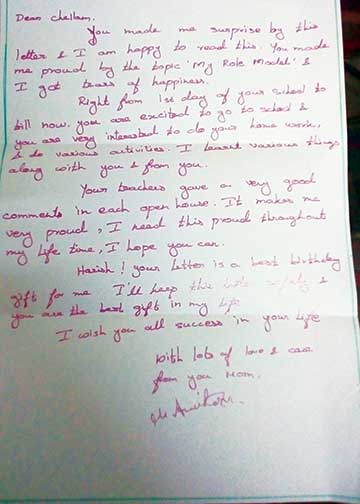P. Ajitha
A language teacher with a mandate to hone LSRW (Listening, Speaking, Reading and Writing) skills through learning resources gleaned from the finest literary pieces is presented with various opportunities to enable learning in an affective domain. Being a student of literature, I cannot but help exploit the power of human narrative to make a universal connection to basic human nature in all its complexities and intricacies. Making this personal connection with the text; to place a universal experience in a personal context enables self-awareness and fosters a better understanding of the self. The ability to relate to a universal human experience and validating it through a lived experience can be an exhilarating experience for young learners seeking to express themselves!

Let me give you an authentic classroom experience. The extended activity after the transaction of the lesson The Letter by Dhumaketu (Literature Reader of Class X, Communicative English course) was a rewarding experience for the students because of the personal connection that we brought into the activity.
The Letter is the story of an old man, Ali, who is waiting to hear news of his daughter who was married off to a soldier and is now away. Ali waits patiently for five years for a letter from his daughter which never comes during his lifetime. Rain or shine, he walks to the post office everyday in the hope of receiving the much anticipated letter from his daughter. He becomes an object of ridicule and everyone at the post office has fun at his expense. They dismiss him as a lunatic and attribute his daily pilgrimage to the post office as a penance for his sins.
Finally one day, Ali reckons his end to be near and in a last ditch effort urges one of the clerks to forward his letter to his grave in exchange for the savings of his lifetime. That was the last time anyone saw or heard from him. The letter Ali had been waiting for with “boundless faith and infinite patience” does eventually come but only after Ali has crossed over to the beyond! This rattles the postmaster who had on one occasion chided him and called him a “pest”. The postmaster now realizes the worth of the letters in his post office and he starts seeing them “as though each contained a warm beating heart. He no longer thought of them in terms of envelopes and postcards. He saw the essential human worth of a letter.”
One of the learning objectives of the lesson is, “To enable students to internalize the value of communication from loved ones – to value the essential worth of a letter.”
In order to realize this learning objective that falls under the purview of affective domain of learning, a very simple yet effective activity was carried out in the class. The students were asked to bring a sheet of paper and envelope the day after the lesson was transacted. They were then asked to write a letter addressed to their parents to let them know how they felt about them. They were asked to put aside any reserve they had about the intent of the activity and focus on laying bare their sincere and genuine feelings about them. Most students took the activity in earnestness and did what they were instructed; some showed a little hesitation initially, but seeing others at work, gave in; there were still others – a minority – who considered the whole activity a farce and were just whiling away their time on the pretext of ‘thinking’. The next step required them to give their letters to the parents and ask for a ‘return letter’ with a response/reaction to the letter from their children.
 As it turned out, the parents were emotionally overwhelmed by the letters they received and rewarded their children with equally heart touching replies. This simple activity helped my students experience the power of professing their feelings through an epistle, thereby making learning possible in the affective domain and making it a permanent experience.
As it turned out, the parents were emotionally overwhelmed by the letters they received and rewarded their children with equally heart touching replies. This simple activity helped my students experience the power of professing their feelings through an epistle, thereby making learning possible in the affective domain and making it a permanent experience.
The second classroom experience was also a similar letter writing activity. It is based on a story about two boys planning to give a gift to their mothers on Mother’s Day. This was conducted for class VI, again as an extended activity. The activity elicited a spontaneous willingness from students to write an epistle to their mothers to demonstrate their love and appreciation for everything they do. This was even more effective as the enthusiasm of the students and the emotional response from the parents was unmatched and unparalleled. Such receptivity from the students who usually play truant when it comes to completing assigned tasks validated the supposition that only a relatable experience will elicit eagerness to engage with the learning material and achieve the learning objectives.
In the process of engaging with the text, when students are not only receptive to the ideas and values echoed in the text but value the learning from it and are ready to apply it in their lives thereby fulfilling the affective hierarchy of learning, the learning process can be deemed successful.
The author is a teaching practitioner looking for ways to meld her love for creative expression with passion for researching teaching paradigms. She teaches at DPS Coimbatore. She can be reached at ajithapaladugu@gmail.com.
